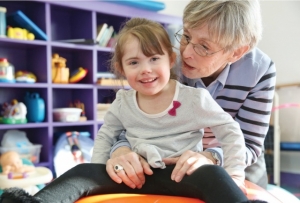Cheering them on
By Phyllis Moore
Published in News on February 4, 2015 1:46 PM

News-Argus/MELISSA KEY
Martie Saylors, Wayne County Public Schools' only physical therapist, helps Mia Mozingo, 4, strengthen her core muscles by playing on a large bouncy ball at Edgewood School. Mia has Down syndrome and was using a walker when she first started walking but can now walk on her own. Mrs. Saylors recently was named an Exceptional Children Teacher of Excellence.

News-Argus/MELISSA KEY
Martie Saylors has devoted the past 28 years of her career in Wayne County Public Schools to improving the quality of life for physically challenged students.
It may be a Down syndrome child lacking muscle tone, helping him graduate from a walker to crutches, or finding adaptive equipment so a student can hold his head up in class.
She also works hand in hand with parents and classroom staff, passing along techniques that she uses during twice-a-week sessions with the child. She also trains bus drivers to ensure students with disabilities are properly transported to and from school.
But to many families and educators, she is known as a "genuine friend."
"She's compassionate, hard-working, diligent," said Michelle Hamm, the director of exceptional children for the schools. "She can say what needs to be said in order to support the needs of a student and she does it with heart.
"This is a person that has more than just a job. She's somebody who's passionate about the students she serves."
Mrs. Saylors was recently recognized by the state Department of Public Instruction as a 2014 Exceptional Children Teacher of Excellence, an award presented to one exceptional children teacher or related service provider from each of the state's 115 school districts.
"I was stunned," Mrs. Saylors said upon learning of her nomination and subsequent recognition. "There are so many excellent EC teachers and other related services -- speech therapists, occupational therapists, hearing specialists.
"I was very humbled and still, embarrassed is not the right word, I just feel that there are so many deserving people that worked so hard and give way more than what's expected. It's definitely been a high point in my career."
A career that began accidentally, she says now.
"I was always interested in health care," she said. "When I got out of school, I went to UNC and worked in acute care in a hospital. The first four years of my experience were acute care, primarily adults."
The unexpected opportunity to work in the school system was convenient at the time for the mother of three.
"I knew the principal (at Edgewood Community Developmental School) and his therapist was leaving the area. He had a vacancy and asked me to come and take a look," she recalled. "At that point, I had really not worked with children."
It proved to be a good match, with her primarily based at Edgewood, considered a "public separate school" for its concentration of developmentally delayed and special needs students.
"Up until five years ago, we were just here (at Edgewood) and five years ago there was a part-time contractual physical therapist that covered other schools," she said. "The most physically involved students are here but there are still many out in the other 32 schools. We have students in 23 of the schools."
The caseload is currently 93 students, with two types of services provided, she said -- direct treatment and support. Children in direct treatment are considered the "highest need" and generally are the younger children requiring more constant monitoring for development, while older students typically fall under a general support plan.
Her role is to assess the students' needs and put a plan of care in place. Sometimes that means acquiring specialized equipment, as well as coordinating with Medicaid and vendors.
While she is considered the district's only physical therapist, she is not alone in her efforts.
"I have a full-time physical therapy assistant who has worked with me for 23 years, Kelly Barrow," she said. "My mission here is to do everything I can and (with) Kelly, to improve that child's physical ability and that they have access to their education."
They work with nearly 30 students at Edgewood and probably another dozen non-ambulatory students in other schools. There is also a segment of students, she added, considered "medically fragile" who have been in school at one time but now are on homebound status. For those 10 or 12 students, she said she makes home visits to work with the child.
The key to any success is in getting buy-in from others, she said.
"The staff in the schools, everyone is invested in the students," she said. "The EC staff, they're special people because they're really invested in the total child. I wish you could hear the whole staff in this school, or Spring Creek or Meadow Lane. There are just so many examples."
Mrs. Saylors may be adept at securing services or working one-on-one with students, but having parents and staff on board is priceless.
"We couldn't do it without their reinforcement, because we see that child twice a week but the rest of the time we're counting on them to reinforce the effort," she said. "You can tell the difference in the families who reinforce what we're trying to do here. It makes all the difference."
